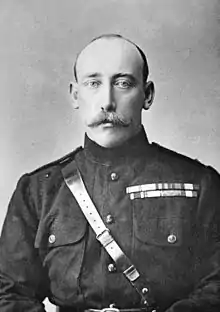| Prince Christian Victor | |||||
|---|---|---|---|---|---|
 | |||||
| Born | 14 April 1867 Windsor Castle, Berkshire | ||||
| Died | 29 October 1900 (aged 33) Pretoria, South African Republic | ||||
| Burial | 1 November 1900 Pretoria, South Africa | ||||
| |||||
| House | Schleswig-Holstein-Sonderburg-Augustenburg | ||||
| Father | Prince Christian of Schleswig-Holstein | ||||
| Mother | Princess Helena of the United Kingdom | ||||
| Military career | |||||
| Allegiance | |||||
| Service/ | |||||
| Years of service | 1888–1900 | ||||
| Rank | Major | ||||
| Unit | King's Royal Rifle Corps | ||||
| Battles/wars | |||||
Prince Christian Victor Albert Louis Ernst Anton of Schleswig-Holstein[1] GCB GCVO DSO KStJ (14 April 1867 – 29 October 1900) was a member of the British royal family. He was the eldest son of Princess Helena, third daughter of Queen Victoria.
Early life
Prince Christian was born on 14 April 1867, at Windsor Castle. His father was Prince Christian of Schleswig-Holstein, the third son of Christian, Duke of Augustenborg, and Countess Louise Sophie of Danneskiold-Samsøe. His mother was Princess Helena, the fifth child and third daughter of Queen Victoria of the United Kingdom and Prince Albert. His parents resided in the United Kingdom, at Cumberland Lodge, and the Prince was considered a member of the British royal family. Under letters patent of 1866, he was styled His Highness Prince Christian Victor of Schleswig-Holstein.
He was baptised in the private chapel at Windsor Castle. His godparents were Queen Victoria (his maternal grandmother), the Duke of Augustenburg (his paternal grandfather; represented by Prince Arthur), the Prince of Wales (his maternal uncle), the Crown Princess of Prussia (his maternal aunt; represented by Princess Louise), the Duke of Saxe-Coburg and Gotha (his maternal great-uncle; represented by the Duke of Edinburgh), and the Dowager Princess of Hohenlohe-Langenburg (his maternal half-great-aunt; represented by Lady Churchill).[2]
Education
The Prince, who was educated at Lambrook, Wellington College, Magdalen College, Oxford, and the Royal Military College, Sandhurst, was commissioned into the King's Royal Rifle Corps (60th Rifles) in 1888, serving in the 4th Battalion King's Royal Rifle Corps.
"Christle", as the prince was known in the family, was the first member of the Royal Family to attend school instead of being educated by a tutor at home. That he studied at Wellington College made Queen Victoria very happy, as Prince Albert had helped to establish the institution many years before. At Wellington he played for the college First Eleven in 1883 and was captain of the cricket team in 1885. He was also captain of the cricket team while at Magdalen College and at Sandhurst, and made a single first-class appearance, for I Zingari against Gentlemen of England in 1887. He remains the only member of the British royal family to play cricket at such a high level.[3]
Military career
Upon leaving Sandhurst in 1888, the Prince became a British Army officer in the King's Royal Rifle Corps. Posted to India, he participated in the Hazara and Miranzi expeditions in 1891 and the Isazi expedition in 1892. Moving to West Africa, in 1895 he participated in the Ashanti Expedition in the Gold Coast, now Ghana.
Upon his return, he was elevated to the rank of Major and then served under Lord Kitchener in 1898 when British and Egyptian troops defeated the Dervishes at Omdurman near Khartoum and recovered the Sudan.
The following year he served as a staff officer in the Second Boer War, being involved in the relief of Ladysmith[4] under General Sir Redvers Buller and later was with Lord Roberts in Pretoria.
Cricket
The Prince was a keen amateur cricketer, and played a single first-class match for I Zingari in 1897.[5] He scored 35 and 0.[6] In lesser cricket, he represented Wellington College and also founded his own eponymous cricket team.[7][8]
Death

In October 1900, while in Pretoria, he came down with malaria, and died of enteric fever, on 29 October, aged 33, after receiving Holy Communion in the presence of Lord Roberts and Prince Francis of Teck. He was interred in the Pretoria cemetery on 1 November 1900. His grave is marked with a granite cross and a cast-iron railing.
Writing in her journal, the Prince's grandmother Queen Victoria wrote of her grandson's death:
"I went upstairs, Thora came in & in a faltering voice said "He is gone". I could not believed it, it seemed too dreadful & heart breaking, & this dear excellent, gallant Boy, beloved by all, such a good, as well as brave & capable officer, gone! To think that he had gone through the Indian campaign, Ashanti, (where our beloved Liko was taken) the Soudan, (going down in his ship) & now again in S. Africa had passed through endless hardship, & dangers, without being ill, or getting a scratch, — to fall a victim to this horrid fever, just on the eve of his return home, — oh! it is really too piteous."
His sister, Princess Marie Louise, wrote in her memoir My Memories of Six Reigns that she was visited by the ghost of Prince Victor while at home in South Kensington, 18 months after his death.[10] She said that he told her that he had come "to see that you were all right and happy" and that she was not to follow him downstairs. She greeted him as 'Kicky' as that was the nickname his siblings called him. He was seated with his favourite dachshund on his knee and was dressed in his army khaki. She only remembered that he had died after he had left the room.[10]
Legacy


There is a monument to him in the Chapel of the Crucifixion at Frogmore Mausoleum by Emil Fuchs. It was originally placed in St George's Chapel. Another monument dedicated to him also serves as a monument to the fallen officers, NCOs and Soldiers of the Devonshire, Somerset and Gloucestershire Regiments who lost their lives in the Boer War. This monument is located on Plymouth Hoe in Plymouth, outside the entrance to the Royal Citadel.
There is also a statue of the Prince outside Windsor Castle (Berkshire, England), erected by his friends. The accompanying plaque displays his orders and campaign medals.
Prince Christian's parents dedicated a window to him in the Royal Chapel of All Saints in Windsor Great Park in 1905.[11]
T. Herbert Warren's biography of Prince Christian was published by John Murray in 1903.[12]
Honours
 United Kingdom:
United Kingdom:
- GCB: Extra Knight Grand Cross of the Bath (civil division), 19 July 1890[13]
- GCVO: Knight Grand Cross of the Royal Victorian Order, 8 December 1898[14]
- DSO: Distinguished Service Order
- KStJ: Knight of Justice of St. John[15]
- Queen Victoria Golden Jubilee Medal, with clasp for Diamond Jubilee
- India General Service Medal (1854)
- Ashanti Star
- Queen's Sudan Medal
- Queen's South Africa Medal
.svg.png.webp) Kingdom of Prussia: Knight of the Red Eagle, 1st Class, 28 July 1891; 3rd Class with Swords, 22 December 1891[16]
Kingdom of Prussia: Knight of the Red Eagle, 1st Class, 28 July 1891; 3rd Class with Swords, 22 December 1891[16].svg.png.webp)
.svg.png.webp)
.svg.png.webp) Ernestine duchies: Grand Cross of the Saxe-Ernestine House Order
Ernestine duchies: Grand Cross of the Saxe-Ernestine House Order Grand Duchy of Hesse: Grand Cross of the Ludwig Order, 1 January 1890[17]
Grand Duchy of Hesse: Grand Cross of the Ludwig Order, 1 January 1890[17] Duchy of Anhalt: Grand Cross of Albert the Bear, 1891[18]
Duchy of Anhalt: Grand Cross of Albert the Bear, 1891[18].svg.png.webp) Ottoman Empire: Order of Osmanieh, 1st Class
Ottoman Empire: Order of Osmanieh, 1st Class.svg.png.webp) Khedivate of Egypt: Khedive's Sudan Medal
Khedivate of Egypt: Khedive's Sudan Medal
Ancestry
| Ancestors of Prince Christian Victor of Schleswig-Holstein |
|---|
References
- ↑ Eilers, Marlene A., Queen Victoria's Descendants, 1987, Genealogical Publishing Company, p. 205.
- ↑ Queen Victoria's Journals – Tuesday 21st May 1867
- ↑ "Never a famous cricketer", Jonathan Rice. Wisden Cricketers' Almanack 2001.
- ↑ Army of Natal
- ↑ ESPN cricinfo.com website: How do you spell that? Steven Lynch, 30 April 2012.
- ↑ "Royalty on the cricket field". International Cricket Council. Retrieved 18 May 2018.
- ↑ https://cricketarchive.com/Archive/Players/28/28535/Other_matches.html%5B%5D
- ↑ "Archived copy". Archived from the original on 18 May 2018. Retrieved 31 October 2017.
{{cite web}}: CS1 maint: archived copy as title (link) - ↑ "Journal Entry : Monday 29 October 1900". queenvictoriasjournals.org. 2012. Retrieved 21 May 2022.
- 1 2 Louise, Princess Marie (1959). My Memories of Six Reigns. Penguin Books. pp. 225–226. OCLC 16608948.
- ↑ Jane Roberts (1997). Royal Landscape: The Gardens and Parks of Windsor. Yale University Press. pp. 347–. ISBN 978-0-300-07079-8.
- ↑ "Review of Christian Victor: the Story of a Young Soldier by T. Herbert Warren". The Athenaeum (3946): 744. 13 June 1903.
- ↑ Shaw, William Arthur (1906). The Knights of England. Vol. 1. London: Sherratt & Hughes. p. 213.
- ↑ Shaw, p. 418
- ↑ "No. 26725". The London Gazette. 27 March 1896. p. 1960.
- ↑ "Rother Adler-orden", Königlich Preussische Ordensliste (supp.) (in German), vol. 1, Berlin, 1886, pp. 8, 25 – via hathitrust.org
{{citation}}: CS1 maint: location missing publisher (link) - ↑ "Ludewigs-orden", Großherzoglich Hessische Ordensliste (in German), Darmstadt: Staatsverlag, 1898, p. 8 – via hathitrust.org
- ↑ "Herzoglich Hausorden Albrechts des Bären", Hof- und Staats-Handbuch für das Herzogthum Anhalt (in German), Dessau: Dessau, Im Selbstverlage des Herausgebers, 1894, p. 17, retrieved 16 June 2020